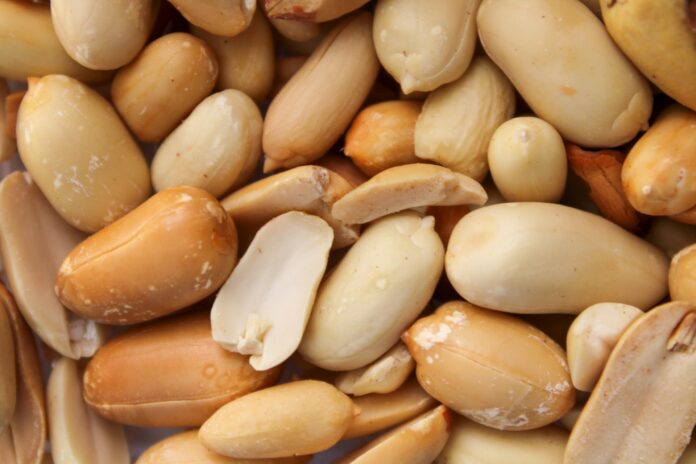Feeding infants peanut products from four to six months can drastically reduce the likelihood of developing a peanut allergy by age 13, according to new research
Feeding children peanut products from infancy until the age of five significantly reduces their risk of developing a peanut allergy in early adolescence, according to a new study. The research found that children who consumed peanut pastes or puffed peanut snacks regularly from four to six months onwards were 71% less likely to have a peanut allergy by age 13 compared to those who avoided peanuts.
The study suggests that this simple dietary intervention could prevent approximately 10,000 cases of potentially life-threatening peanut allergies each year in the UK alone, and reduce global cases by 100,000 annually. This revelation marks a significant shift from decades of advice that recommended avoiding peanuts to prevent allergies.
Embed from Getty ImagesProfessor Gideon Lack, a leading expert in paediatric allergy at King’s College London, emphasized the importance of early peanut exposure. He stated, “I strongly recommend that babies are introduced to peanuts by four months if they have eczema and by six months if they don’t have eczema.” He explained that babies with eczema are at a higher risk of developing peanut allergies, likely due to the food’s ability to penetrate the skin and trigger an immune response.
Peanut allergy rates have surged in many Western countries over recent decades. In the UK, one in 50 children now suffers from the allergy, with around 14,000 new cases diagnosed each year. While approximately 20% of children outgrow the allergy, the remaining 80% must avoid peanuts for life, facing the constant risk of severe allergic reactions.
Contrary to popular belief, peanuts are legumes, not nuts. They belong to a different plant family than tree nuts such as almonds, Brazil nuts, cashews, pistachios, and walnuts. However, about a third of children with peanut allergies also exhibit allergies to at least one type of tree nut.
Previous research by the same team found that regular peanut consumption from infancy reduced the risk of peanut allergy by 81% at age five compared to those who avoided peanuts. The latest study, known as the Leap-Trio trial, followed 508 children to an average age of 13. The children were free to eat or avoid peanuts after the age of five, and the study found that early peanut exposure continued to offer significant protection against peanut allergies.
The results, published in NEJM Evidence, demonstrate that early peanut consumption leads to long-lasting protection against peanut allergies. This protection remained intact regardless of the children’s peanut-eating habits after the age of five. Professor Lack highlighted the “double advantage” of early peanut introduction, noting that it not only prevents the majority of peanut allergies but also allows for earlier identification and treatment of children who do develop the allergy.
The researchers recommend introducing peanut butter or peanut puffs to children who are still breastfeeding once they can manage soft foods. They advise giving the equivalent of a heaped teaspoon of peanut butter three times a week. Whole or chopped peanuts should be avoided due to the choking risk, but peanut puffs can be ground into a suitable paste for babies.
Analysis :
The implications of this study are profound, not only for individual families but also for public health policy. From a medical perspective, the findings offer a straightforward, cost-effective intervention to combat a common and potentially life-threatening allergy. The reduction in peanut allergy cases would decrease healthcare costs and reduce the emotional and psychological burden on affected families.
Politically, this study could influence national health guidelines and policies. Governments and health organizations might revise their recommendations to include early peanut introduction as a standard practice. This policy change could face resistance from those who adhere to older guidelines or have concerns about early allergen exposure. However, the overwhelming evidence supporting the benefits of early peanut introduction may outweigh these concerns.
Sociologically, the study highlights the role of parental practices and societal norms in health outcomes. Decades of advice to avoid peanuts created a culture of caution around early allergen exposure. Changing these deeply ingrained practices will require significant public health education and outreach to reassure parents and caregivers.
Economically, the study suggests potential savings in healthcare costs associated with treating peanut allergies. Early intervention could reduce the need for emergency care and long-term management of peanut allergies. Additionally, the food industry might see a shift in demand towards products designed for early peanut introduction, creating new market opportunities.
From a gender perspective, the study does not indicate any differences in outcomes between boys and girls. However, it underscores the importance of maternal health and nutrition practices, particularly for breastfeeding mothers who may need guidance on incorporating peanut products into their babies’ diets safely.
Considering minority and marginalized groups, ensuring equitable access to peanut products for early introduction is crucial. Socioeconomic disparities could influence the ability of some families to follow these new guidelines. Public health campaigns should focus on providing resources and support to underprivileged communities to maximize the benefits of early peanut exposure across all demographics.
In conclusion, this study represents a significant advancement in our understanding of peanut allergy prevention. The findings advocate for a proactive approach to introducing peanut products in infancy, potentially transforming public health strategies and reducing the global burden of peanut allergies.
